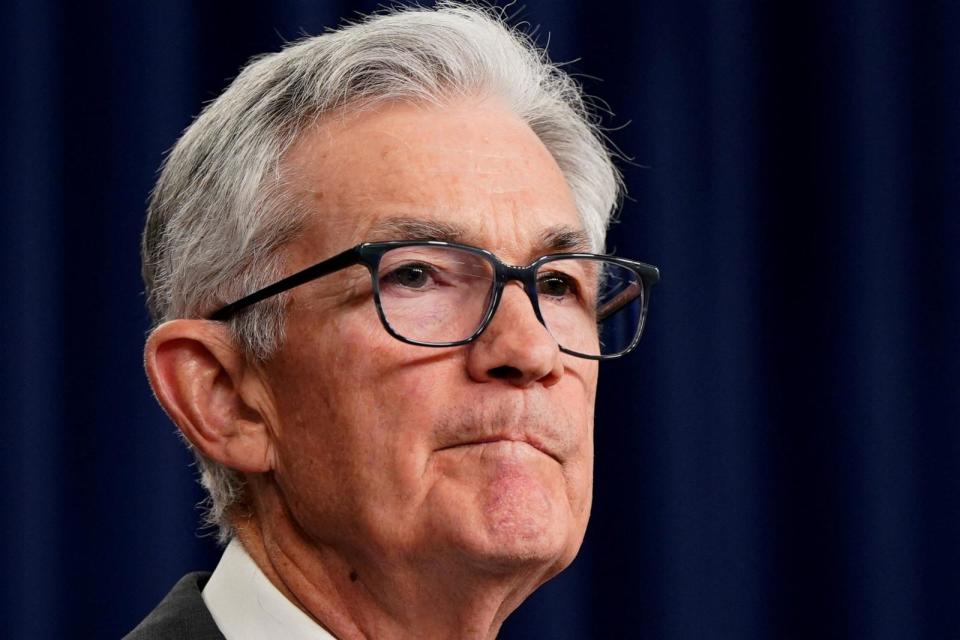The US economy is cooling off. Why experts say there's no need to worry yet
The U.S. economy slowed dramatically at the outset of 2024, though it continued to grow at a solid pace.
The finding, released in a Commerce Department report this week, renewed a question that has lingered over the economy: Should Americans be worried about where it's headed?
Economists who spoke to ABC News downplayed any alarm raised by the fresh data, pointing to resilient economic activity driven by the steadiness of U.S. consumers. The country remains far from the onset of a recession, they said.
However, some experts pointed to the report as a sign of the possible emergence of twin threats: a gradual economic cooldown alongside stubborn inflation. That trend could force the Federal Reserve to keep interest rates high even as the economy falters.
"GDP decelerated pretty significantly," Stephan Weiler, a professor of economics at Colorado State University and a former Fed research officer, told ABC News, but he acknowledged the limitations of the new finding.
"One should be careful about ever using one quarter's data to get panicked," Weiler added.
MORE: Hidden world of 'catch-and-kill' tabloids spotlighted in Trump's hush money trial
Gross domestic product, a measure of all the goods and services produced in the economy, recorded 1.6% annual growth over the first three months of the year, the Commerce Department said this week.
That figure marked a steep slowdown from a 3.4% annual rate measured over the final quarter of last year. The economy cooled off more than economists expected over the first three months of 2024.
Consumer spending, which accounts for nearly three-quarters of U.S. economic activity, slowed markedly when compared with the final months of 2023, the data showed.
That slowdown appears to owe in part to a reduction in the personal savings rate, suggesting that many Americans have spent down much of the financial cushion they built during the pandemic.
"The consumer keeps this economy afloat," Weiler said. "And personal savings is where the rubber hits the road."
Still, economists said the overall cooldown in GDP triggered little alarm because the trend owes in large part to a surge in the gap between imported and exported goods, according to the Commerce Department data.
That gap weighs on GDP growth since imported goods do not result from U.S. production, but the purchases from overseas indicate that U.S. consumption remains robust, economists said.
"Strong imports from overseas are a sign that spending by consumers and businesses is strong," Luke Tilley, chief economist at investment firm Wilmington Trust, told ABC News.
When asked about the health of the U.S. economy, Tilley added: "I'm not concerned at all."

The solid, albeit cooler growth at the outset of this year coincided with stubborn inflation. Rapid price increases may delay highly anticipated interest rates at the Federal Reserve, which are expected to stimulate the economy, economists said.
Consumer prices rose 3.5% in March compared to a year ago, accelerating markedly from the previous month and reversing some of the progress achieved in a two-year fight to slow price increases.
The new GDP report raises eyebrows because the economy already faces the challenge posed by inflation, Bret Kenwell, a U.S. investment analyst at eToro, told ABC News in a statement.
MORE: Corporations struggle on climate goals amid backlash over 'woke capitalism,' experts say
"It's not necessarily a report to panic over, but it's one to pay attention to," Kenwell said. "It's one thing to have moderate inflation with above-average growth. It's another thing to have stubborn inflation and stifled growth."
The Fed Funds rate stands between 5.25% and 5.5%, matching its highest level since 2001. The high interest rates make borrowing more expensive for consumers and businesses, placing downward pressure on the economy.
Under its so-called "dual mandate," the Federal Reserve retains responsibility for keeping inflation at normal levels and achieving maximum employment.
In turn, the economic cooldown at the outset of 2024 offers a silver lining, since further slowing and potential layoffs could trigger interest rate cuts even if inflation remains stubborn, some experts said.
"This GDP report could nudge the Fed closer to a rate cut, although it would be much better to see the Fed cutting rates due to lower inflation rather than worries over the economy," Kenwell said.
The US economy is cooling off. Why experts say there's no need to worry yet originally appeared on abcnews.go.com

 Yahoo Finance
Yahoo Finance 